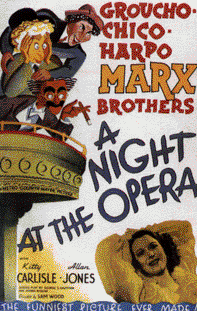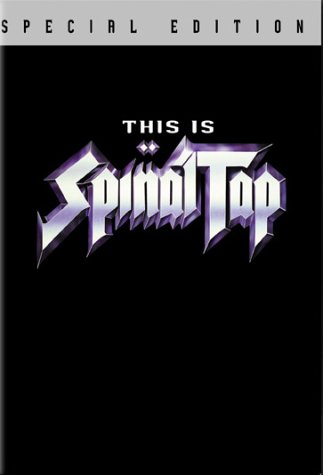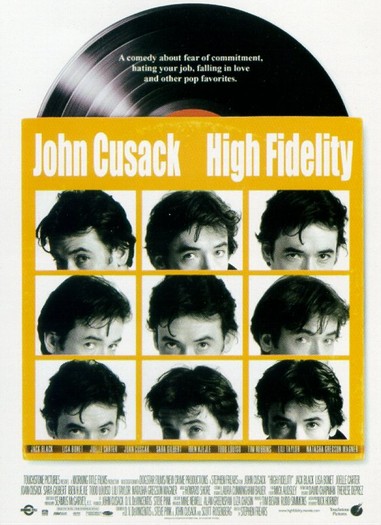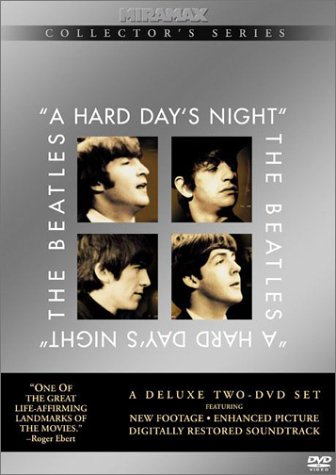Comedy in the Musical Arena
Introduction
In a refreshing change of pace from January's long, somber, high-brow tragedies, February at the Movie Club will feature a quartet of short, fast-paced, middle-brow comedies in the musical arena (not to be confused with musical comedies, however). Stephen Fry's utterly invaluable book Stephen Fry's Incomplete and Utter History of Classical Music informs us that classical music is divided into four major eras: Baroque, Classical, Romantic and Modern. (Hmm, must be something to the fact that Classical is between Baroque and a hard place.)
Likewise, we will showcase four different eras of comedies in the musical arena, beginning with the 1935 Marx brothers classic A Night at the Opera, then zooming forward 49 years to arrive at This is Spinal Tap, crawling up a further 16 years to the utterly modern High Fidelity, and finally, a flashback to the '60s with the Beatles' A Hard Day's Night.
A Night at the Opera

Milos Forman's Amadeus was released in 1984 with the tagline "The Man...The Music...The Madness...The Murder...The Motion Picture". A Night at the Opera (IMDB Link), made nearly 50 years earlier, fits that tagline almost perfectly. Well, except for the part about murder...we'll have to get rid of that. And "The Music" might describe the Queen album better than it does the movie; that'll have to go too. Hmm, maybe we should also change "The Man" to "The Men", since Groucho, Chico and Harpo all have their fair share of fun with the material. The Madness? That can stay, all right; as Chico might say, there ain't no sanity clause in a Marx brothers movie.
A Night at the Opera is the closest thing the Marx brothers made to a real motion picture -- with a genuine story that arguably makes sense when one is sufficiently under the influence, and characters who may be generously described as being quarter-way plausible -- which may be a good thing or a bad thing depending on which side of the story-humor divide one falls on. The stickler for sensible stories would appreciate the harnessing of the habitually wild Marx madness in the service of a legitimate, albeit conventional, storyline involving tangled romance. On the other hand, the more rebellious Marx fanatic might wonder why precious screen time is wasted on unfunny moments of cliched courtship, instead of throwing the plot to the devil and stuffing the film wall-to-wall with zany, comic set-pieces that may not have all that much to do with one another, a methodology that had been used to good effect in many other Marx efforts.
There isn't much to describe about A Night at the Opera. It is one of those movies where the pleasure is in the watching, stuffed with a never-ending sequence of slapstick, sight gags and one-liners, interspersed with the occasional song-and-dance routine that affords one the opportunity to regain one's breath after the previous bout of laughter. Among the classic moments in the film are the contract negotiations involving Groucho and Chico, the stateroom scene on the ship, the scene with the moving furniture, and the grand finale featuring a unique performance of a Verdi opera. In addition, Groucho Marx is his usual quotable self playing Otis B. Drifwood, the business manager of Margaret Dumont, hired to help her establish herself in society as a patron of the opera, and alternately insulting and romancing her in his inimitable style. There is a romantic sub-plot involving the penniless Ricardo (Allan Jones), represented by agent Chico Marx, and the opera singer Rosa (Kitty Carlisle), with the backbone of the story being provided by the brothers' antics in bringing about their re-union.
One of the pleasures of owning the Marx brothers movies on DVD is that each movie comes with a perfect set of chapter stops. Recipe for a perfect evening: Just pop in one of these movies, skip the chapters with the song-and-dance routines (especially in their later MGM films), and you have an unbroken stretch of unadulterated fun. Unlike Groucho, you won't find yourself remarking at the end of it all, "I have had a perfectly wonderful evening, but this wasn't it."
Additional Resources
More Like This
- Duck Soup -- Groucho plays Rufus T. Firefly, dictator of Freedonia, in this truly anarchic comedy.
- A Day at the Races -- More Marx comedy.
- A Night in Casablanca -- When Warner Brothers threatened to sue over the use of "Casablanca" in the title, Groucho is alleged to have threatened a counter-suit over Warner's use of "Brothers" in their name.
This is Spinal Tap
 IMDB Link
IMDB Link
When This is Spinal Tap first hit movie screens in 1984, many members of the audience allegedly emerged from the theaters under the impression that they had just seen an interesting, albeit funny, documentary about an obscure British rock band. That the fact of the film being a mockumentary about a fictional band was not telegraphed is as much a tribute to the film's cinema verite style, well-developed characterization and plausible plotting, as it is to the excesses of the rock & roll world in which outre behaviour does not induce any amount of incredulity.
Directed by then-rookie Rob Reiner (The Princess Bride, When Harry met Sally) with a script improvised by the cast as they went along, Tap was only moderately successful in its initial run, but went on to become a massive cult favorite on video; spawned the transformation of the fictional band into a real one, complete with full-fledged album releases and music tours; and ended up pushing the band into VH1's list of the Top 100 Rock&Roll bands of all time.
The story ostensibly involves the noted documentarian Marty DeBergi (played by Reiner himself) presenting an inside look into the famed British rock band Spinal Tap as they tour the U.S. promoting their latest effort, "Smell the Glove". While the film starts on a note of great optimism, it soon becomes clear that the best of Spinal Tap is very much behind them as we see the band unraveling in hilarious fashion, being booked into smaller and smaller performances in smaller and smaller towns, failing to attract a single customer during a CD signing in a music store, getting lost on the way from the dressing room to the stage, having dwarves trampling over their props thanks to a "set-design malfunction", and eventually experiencing the ultimate indignity of receiving second billing to a puppet show.
But Tap's fun runs much deeper than the surface humor underlining the steep decline of a band's fortunes; we are also treated to a magnificent skewering of the rock & roll tradition, its puerile, misogynist lyrics, the self-delusional, occasionally moronic prima donna stars, the selling out of musical innovation in search of popularity, the high churn in band membership and, of course, the inevitable conflicts between the lead singer and the guitarist. The satire draws generously from real-world events involving many famous bands such as the Beatles, Led Zeppelin, Black Sabbath and Judas Priest but, at the same time, retains enough of a generic flavor that the object of derision is the genre as a whole. The music of Spinal Tap is a revelation, being of a surprisingly high calibre given the amateur status of the performers, and some of the songs are scarcely distinguishable, at least on technical merits, from their brethren being spoofed; the only give-away is the pointed exaggeration of some of the music and lyrics, and moments such as when Nigel Tufnell (Christopher Guest) plays his guitar by rubbing a violin against it, parodying Jimmy Page's use of a violin bow.
One could certainly make a fairly compelling argument to count Spinal Tap among the greatest bands of all time and, in fact, such an argument appears to have been successfully made in including it in VH1's list of the best bands of all time. It must be admitted that the lyrical sophistication of Spinal Tap would probably only qualify as being a touch above average. (See, for example, "Big Bottom" and "Sex Farm Woman". ) On the other hand, their musical range runs the gamut from flower-power pop ("Listen to the flower people") to the heavy metal of "Hell Hole" with even an occasional classical composition thrown in ("I'm really influenced by Mozart and Bach, and it's sort of in between those really. It's like a Mach piece..."); they have some of the catchiest album titles and cover art in musical history (Who can compete with "The Gospel according to Spinal Tap" and "Intravenus de Milo"?); and their live performances are something to behold --- their amps go all the way up to 11!
Additional Resources
More Like This
- Waiting for Guffman -- Christopher Guest does for theater what Tap did for rock & roll.
- Best in Show -- This Christopher Guest mockumentary is about a dog show.
- A Mighty Wind -- Yet another mockumentary from Guest, this time about a country music band.
High Fidelity
 IMDB Link
IMDB Link
Compulsive listmaker, record-store owner, and breaker-upper extraordinaire Rob Gordon (John Cusack) compiles his list of "all-time, top-five most memorable break-ups" on the occasion of his latest misfire and, in a bout of introspection, goes off to talk to all the parties involved, pondering such deep questions as "Did I listen to pop music because I was miserable? Or was I miserable because I listened to pop music?". The result is High Fidelity, a medium-fidelity adaptation of Nick Hornby's bestseller seamlessly transplanted from the book's London environs to the filmmakers' haunts in Chicago.
A major challenge confronting the filmmakers would have been the vexing question of how to captures the sly, ironic tone of Hornby's prose, much of which forms a first-person narrative in the book. The solution the filmmakers use is to not only use Cusack as a narrator offering snide commentary over the action, but also break down the so-called "fourth wall" and let him address the audience by speaking directly into the camera. (Not surprisingly, the other major Hornby adaptation, About a Boy, also uses copious amounts of narration for exactly the same purpose.) The device works surprisingly well, and lends a further touch of ironic detachment to the action; the audience is too busy enjoying and laughing at the narrator's wry soliloquies to be put off by actions that may otherwise appear distinctly uncool or cheesy.
The story itself is mostly an excuse for presenting an assortment of delightful characters personifying both male and female stereotypes, and delving into their psyche through a sequence of well-scripted scenes filled with uncommon intelligence and insight. Chief among the cast of characters is Cusack's Rob Gordon, an intelligent, charming, sex-obsessed, commitment-phobic alpha male whose desire for high fidelity in his music collection does not extend to his personal life. Most of the women in his life are painted as little more than bit-part caricatures, running the gamut from a transient childhood sweetheart who dumped him in favor of her eventual husband through an ultra-hip, loquacious, wildcat adventuress (Catherine Zeta-Jones) to a talented, world-weary soulful signer (Lisa Bonet). Standing out in the ocean of strange characters is Laura (Iben Hjejle), the completely normal, overwhelmingly patient, almost boring, girlfriend that Rob breaks up with at the beginning of the movie. Needless to say, all's well that ends well, but not before Rob tries on a little amateur psycho-analysis and takes us on a journey through his life, past and present.
Complementing Rob in the disturbed-male department are his two record-store clerk sidekicks, painfully introverted musical geek Dick (Todd Louiso) and the brash, outrageously snobbish, headbanging singer-wannabe Barry (Jack Black, doing his best John Belushi imitation). Jack Black in particular brings great kinetic energy into the action with his in-your-face intimidation of the store's customers ("God. Do you even know your daughter? There's no way she likes that song. Oops, is she in a coma?"), inane arguments over musical trivia, bitingly funny critiques of everything around him, and a never-ending succession of inventive names for his band ("We're no longer called Sonic Death Monkey. We're on the verge of becoming Kathleen Turner Overdrive, but just for tonight, we are Barry Jive and his Uptown Five."). Also sticking his head into the mix, and nearly getting the door slammed on it, is Tim Robbins, playing a conflict-resolution specialist steeped in eastern philosophy -- Steven Seagal minus the physique -- who turns out to be Rob's competition for Laura's hand.
Ultimately, what stands out about High Fidelity is the quiet intelligence with which it goes about its business, painting vivid sketches of interesting characters sharpened with just a dash of satirical exaggeration and allowing them to speak with a Woody Allen-esque wit not often permitted in a Hollywood movie. ( After all, how many movies have we seen where the protagonist admits to having read "Love in the Time of Cholera"? ) There may not be too many laugh-out-loud moments, but its smooth charm would ensure its place in anyone's list of all-time Top 5 sophisticated romantic comedies: number five with a bullet.
Additional Resources
- Sight and Sound Review -- August 2000 Review of High Fidelity in Sight and Sound magazine. (Hosted by the British Film Institute.)
- Interview with Nick Hornby -- Salon.com talks to Nick Hornby about his book High Fidelity
- Extract from High Fidelity -- Penguin's web site provides an extract from the first few pages of the book. Also links to critics' reviews and an interview.
More Like This
- About a Boy -- Yet another funny adaptation of a Nick Hornby book, this is a very funny movie starring Hugh Grant as a commitment-phobic rich London bachelor who gets a young boy to pose as his child to improve his chances of hooking up with single mothers.
- Bridget Jones's Diary -- Helen Fielding's novel and the subsequent movie does for women what High Fidelity did for men.
- Grosse Pointe Blank -- Another offbeat comedy from the same production team, this one starring Cusack as a troubled assassin attending a high-school reunion while taking care of business on the side.
A Hard Day's Night
IMDB Link
A fictional story featuring the Beatles playing a popular band, and shot in semi-documentary style to further blur the line between reality and fantasy, A Hard Day's Night perfectly captures the spirit of the '60s, and showcases the quick wit and acting prowess of the Beatles. Like when the reporter asks, "How did you find America?" and John responds, "Turned left at Greenland."
Additional Resources
More Like This
- The Rutles -- Hilarious spoof of the Beatles from Eric Idle and the Monty Python gang.
- The Blues Brothers -- No connection to the Beatles, but another very funny movie with great musical performances.



